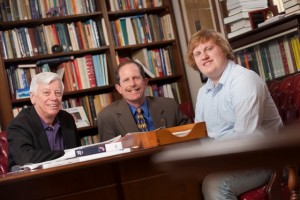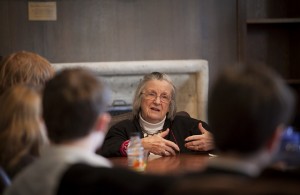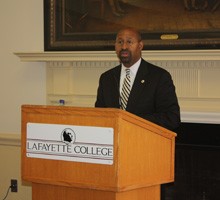
Professor John Kincaid, David Woglom, and Charles Prutzman '11 in the Robert B. and Helen S. Meyner Center for the Study of State and Local Government in Kirby Hall of Civil Rights.
A Nobel Prize winner. A new police chief. Former residents of a low-income housing complex. Hundreds of academics and practitioners worldwide, committed to healthier relationships among national, regional, and local governments.
All these individuals have been united by the Robert B. and Helen S. Meyner Center for the Study of State and Local Government. The center works with government officials nationally and internationally, recruits local municipal managers, and trains students in the frustrating, rewarding work of public works.
The Meyner Center opened in 1994 with funds from the late Robert B. Meyner ’30, who served as New Jersey’s governor from 1954 to 1962, and his late wife, Helen Stevenson Meyner, who represented New Jersey in the U.S. House of Representatives from 1975-79. At its center is founding director John Kincaid, Meyner Professor of Government and Public Service, a prominent authority on federalism, intergovernmental relations, and state and local governments. During his 16 years on College Hill, he’s made the Meyner Center an international forum on federalist approaches to economic development, human rights, government innovation, civic compromises, and ethnolinguistic accommodation.
Last year, Kincaid brought in academics and officials from around the world to his courses on American government, state and local government, and federalism. International guests discussed local government in Japan, the high court in Australia, and federal features of the European Union.

Nobel Prize winner Elinor Ostrom speaks with students.
The most distinguished guest was Elinor Ostrom, co-winner of the 2009 Nobel Prize in Economic Sciences and a longtime colleague of Kincaid’s. Her visit was sponsored by the policy studies program, the Department of Geology and Environmental Geosciences, and the Mellon Foundation. She discussed her specialty — the governance of “common pool” resources, such as forests, fisheries, oil fields, grazing lands, and irrigation systems — with small groups of students and faculty from several disciplines.
Ostrom impressed Charles Prutzman ’11 (Martins Creek, Pa.), who assists Kincaid with research and oversees the center’s developing website. The government & law and psychology double major was captivated by the Nobel winner’s ambition, vision, and decency.
“It’s an honor to be with someone so esteemed, so accessible, and so kind,” he says. “It’s inspiring. It makes you want to reach that level of esteem.”

Philadelphia Mayor Michael Nutter
In June 2009, the center hosted its eighth annual forum on local government. It was keynoted by Michael Nutter, the dynamic mayor of Philadelphia, who discussed how his city has developed innovative programs in education and public safety while combating severe poverty and severe budget cuts. More than 100 municipal leaders also shared other strategies, such as how to decrease utility bills through green designs and increase income through cell-phone towers.
The forum marked a whirlwind year for David Woglom ’78, the center’s associate director for public service. He’s used his political and psychological skills to aid municipalities, especially those that are understaffed and underfunded but eager to improve governance and administration.
Last year, Woglom helped Pen Argyl, Pa., hire a police chief. He smoothly coordinated everything from following state regulations to meeting deadlines, reports borough manager Robin Zmoda. “Dave kept us on track and in focus,” she says. “He took a huge burden off us. He’s very easy to get along with while being businesslike, and that’s a hard line to walk.”
For three years, Woglom has been part of ongoing efforts to stabilize and revitalize Easton, Lafayette’s closest municipal partner. In 2007, he undertook a comprehensive study of the city’s operations, which included reviewing the implementation status of recommendations for improving operations that had been set forth the previous year by consultants under the auspices of Pennsylvania’s Early Intervention Program. His work helped Easton stave off remediation under the state’s Financially Distressed Municipalities Act.
In 2009, Woglom helped Easton hire a city administrator for its new form of government, in which the mayor doubles as president of city council. He also has facilitated retreats that helped the mayor, business administrator, and members of city council enhance communications and pinpoint areas for improvement.
“Dave is a good listener and a good facilitator,” says Easton Mayor Sal Panto Jr. “He has a way of allowing employees to trust him. If they say something out of line, they know it won’t get back to management. It’s the way to get the real truth, not something that’s antiseptic.”
Under an agreement negotiated by Kincaid, the Meyner Center and many other Lafayette professors are providing an in-depth, four-year evaluation of the redevelopment of a public housing complex in South Easton. Funded by a $20 million federal HOPE VI grant, the Housing Authority of Easton demolished the 250 dwelling units in the increasingly derelict and dangerous Delaware Terrace/Annex neighborhood, necessitating relocation of residents in the summer and fall of 2008. Since then, 96 rental units, including family housing and “senior cottages,” have been built in the redeveloped complex, called Neston Heights. Plans also call for construction of 48 low-income homes to be offered for sale.
Under their direction, Lafayette students interviewed nearly 100 former Delaware Terrace residents. This summer, students will interview the first residents of Neston Heights. The evaluation team will use the information to determine whether residents achieve federal objectives for self-sufficiency. “The goal is to make sure that the new residents are good residents,” says Panto.
Kincaid is a leading academic ambassador for the Global Dialogue on Federalism, a multi-year, multi-million dollar project originally proposed by the Meyner Center. A network of 3,000-plus members, it is sponsored by the Forum of Federations and the International Association of Centers for Federal Studies. Kincaid has lectured on federalism from Australia to India, from Ukraine to Egypt. At Lafayette, he helped launch a summer institute for young federalism scholars; in Iraq he helped launch a multi-institutional center for federal studies.
In September 2009, Kincaid was in Philadelphia for an international conference on federalism and the global financial crisis that drew scholars from around the world. Research was presented on Argentina, Australia, Canada, the European Union, Germany, India, Italy, Nigeria, South Africa, Spain, Switzerland, and the United States. The conference was organized and hosted by the Meyner Center and the Center for State Constitutional Studies at Rutgers University, Camden.


